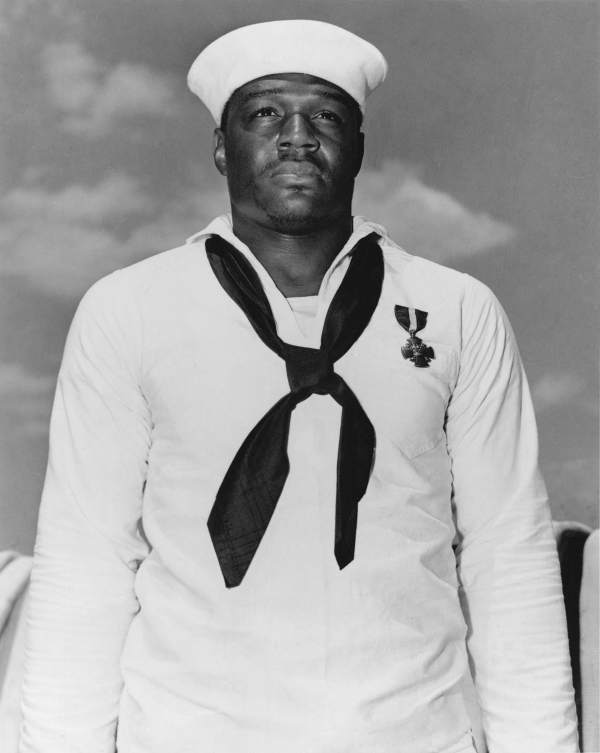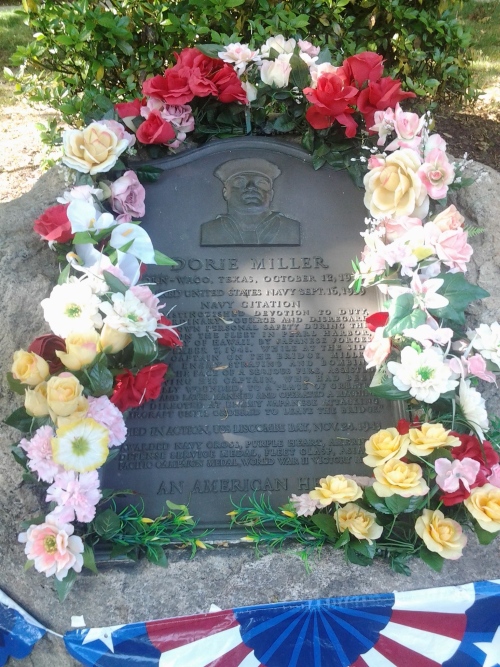Doris Miller (1919-1943)
On December 7, 1941, America was drawn into World War II when Pearl Harbor was attacked by Japan. That morning there were heavy losses due to the Japanese aggression. Heroes would also arise though, including Doris Miller, the first African American to receive the Navy Cross.
Segregated Society
Doris Miller, nicknamed Dorie, was born in Waco, Texas, on October 12, 1919. At the time, society was segregated in America. Schools were separate for white and African American students; this separation was also implemented in the armed forces, where special units were based on skin colour. Notwithstanding this situation, Miller volunteered for the Navy on September 19, 1939. However, not all positions were open to him, because African Americans could only be appointed as Stewards since 1922. As was the case for Miller who eventually became Mess Attendant Third Class. This included preparing and serving food, doing laundry and performing other simple tasks. He was one of 4,007 African Americans who served in the 139,554-strong navy. Combat positions were not allowed for African Americans, because "letting men of the coloured race" only into the kitchen was "in the best interests of general naval efficiency."
Pearl Harbor
On December 7, 1941, the world was shocked when Japan launched an attack on America. Unseen, the Japanese fleet had managed to approach the island of Hawaii and unleash swarms of planes on the American base. Miller was doing laundry aboard the USS West Virginia that morning when Japanese forces caught the Americans by surprise. As soon as the attack started, Miller went to an anti-aircraft gun, but it had already been destroyed. He proceeded to the central meeting place, known as "Times Square," where he was ordered by Officer Doir Johnson to move the mortally wounded Captain Mervyn Bennion to a safe location using an improvised stretcher.
After relocating the officer, Miller was assigned to assist with a .50 machine gun on board the ship. Rather than just supplying ammunition, Ensign Victor Delano, while checking the anti-aircraft guns, saw that Miller fired back at the Japanese planes. Although he was not trained, Miller described his actions as follows: "It wasn't hard. I just pulled the trigger and she worked fine. I had watched the others with these guns. I guess I fired her for about fifteen minutes… They were diving pretty close to us." Miller himself thought he had hit at least one plane, but in the chaos of those days, some witnesses and later historians attributed four or even six planes to him. Although he worked in the kitchen, he was not afraid to risk his life and fight back. Ultimately, a fire forced Miller to abandon ship.
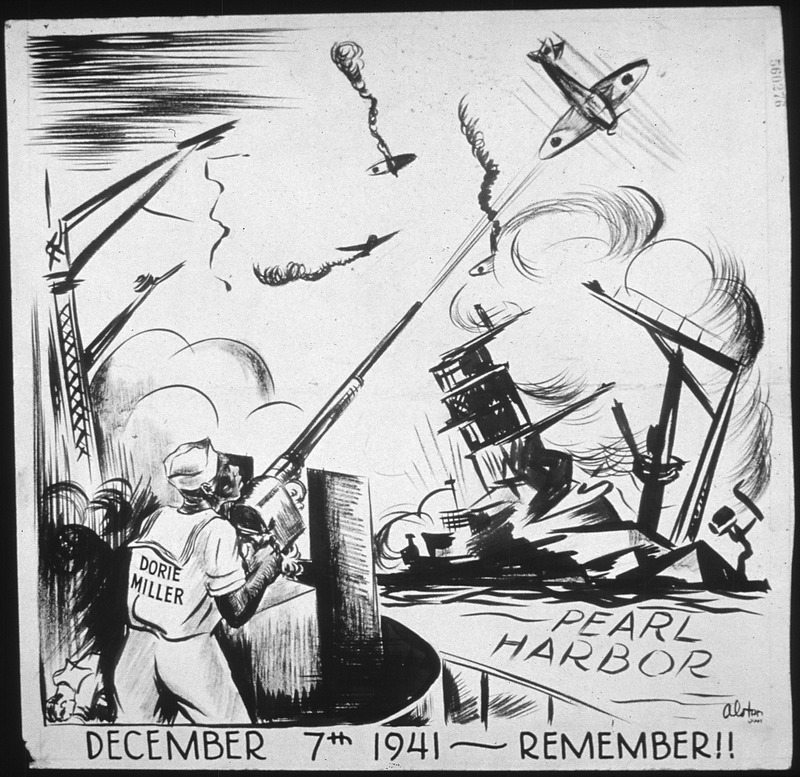
Illustration from 1943 of Miller during the Japanese attack on Pearl Harbor. Source: U.S. National Archives
The combat report noted some of Miller's actions, such as dragging wounded:
Throughout the entire action, and through all the arduous labours which followed, there was never the slightest sign of faltering or of cowardice. The actions of the officers and men were all wholly commendable; their spirit was marvellous; there was no panic, no shirking nor flinching, and words fail in attempting to describe the truly magnificent display of courage, discipline, and devotion to duty of all officers and men. Some examples of outstanding performance of duty are: […]
Lieutenant F. G. White, D-V (G), U.S.N.R., aided by MILLER, Doris, Mess Attendant Second Class, U.S. Navy, was helpful in dragging people through oil and water to the quarterdeck, no doubt saving the lives of a number of individuals who would otherwise have been lost.[1]
The struggle for recognition
In contrast to white heroes, who often went on tour at the home front to boost morale and raise money for the war, Miller just kept going with his work. This no longer aboard the West Virginia, but the USS Indianapolis. At first, his name was not even known to the navy leadership. Only vaguely was it stated by an anonymous officer: "A negro mess attendant who never before had fired a gun manned a machine gun on the bridge until the ammunition was exhausted." Miller was even situated aboard the wrong ship, as his actions were believed to have taken place aboard the USS Arizona, the ship most damaged during the attack. This misreading would persistently affect historiography.
Only after complaints about the unfair treatment by the Pittsburgh Courier, a newspaper targeting African Americans, and the National Association for the Advancement of Coloured People (NAACP), Miller's name was made public in the media. Initially, he received only an honourable mention, but boosted by the success achieved, the NAACP and the Pittsburgh Courier continued their work to gain honest recognition for Miller. At first, Miller only got an honourable mention , but later the Navy altered its position after all. This could have contributed to the fact that Miller could be used to persuade African Americans and other minorities to enlist in the American armed forces. Dorie Miller was nominated for the Navy Cross.
On May 27, 1942, Miller received this award. Together with eight others, he received the decoration from Admiral Chester Nimitz. The admiral, who was also from Texas, then commented: "This marks the first time in the present conflict that such a high tribute has been made in the Pacific Fleet to a member of his race, and I am sure that the future will see others similarly honoured." The citation read as follows:
For distinguished devotion to duty, extraordinary courage and disregard for his own personal safety during the attack on the Fleet in Pearl Harbor […] by Japanese forces on December 7, 1941. While at the side of his Captain on the bridge, Miller, despite enemy strafing and bombing and in the face of a serious fire, assisted in moving his Captain, who had been mortally wounded, to a place of greater safety, and later manned and operated a machine gun directed at enemy Japanese attacking aircraft until ordered to leave the bridge. [2][2]
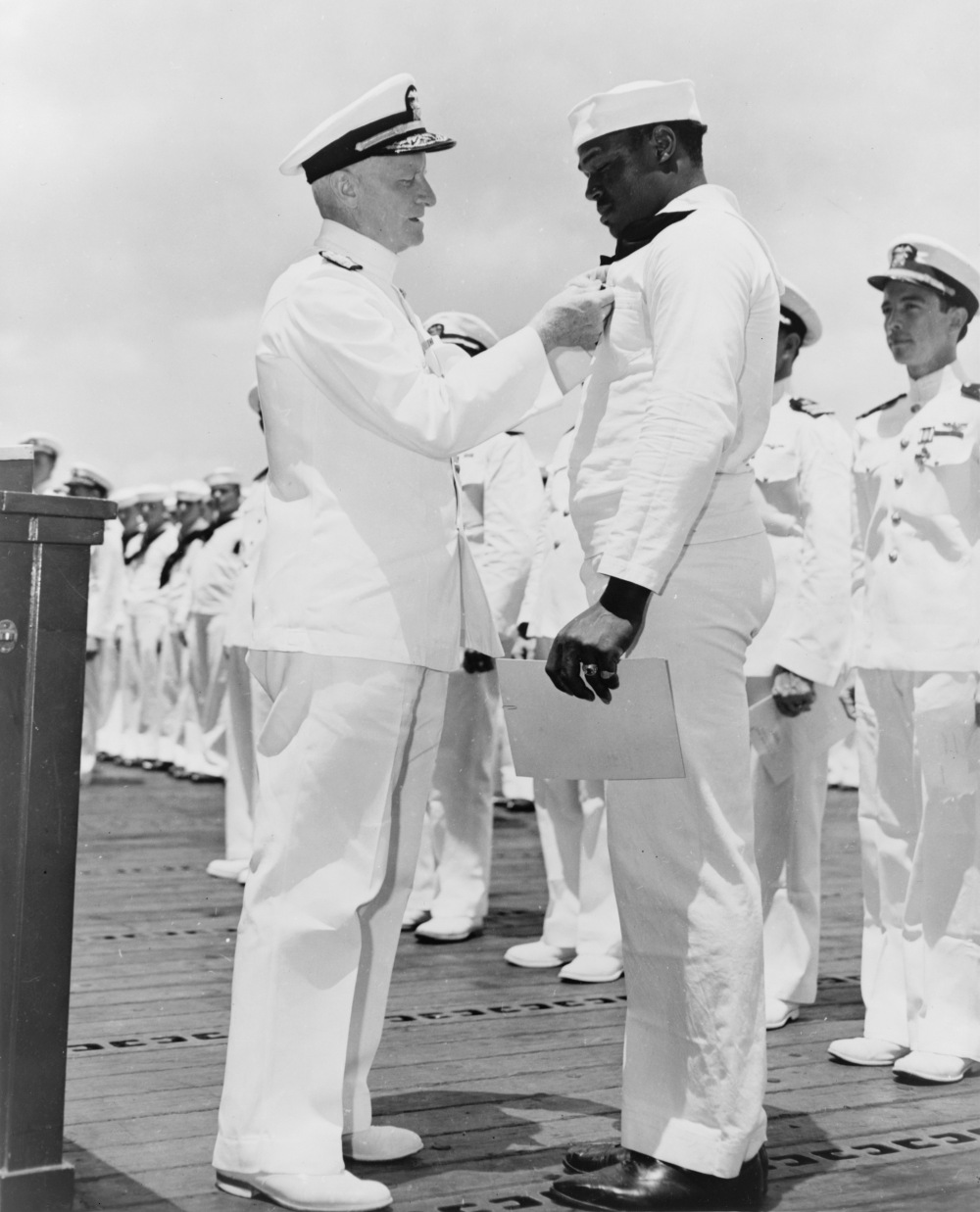
Admiral Chester W. Nimitz presents the Navy Cross to Miller during a ceremony aboard the USS Enterprise (CV-6) in Pearl Harbor, May 27, 1942. Source: U.S. National Archives
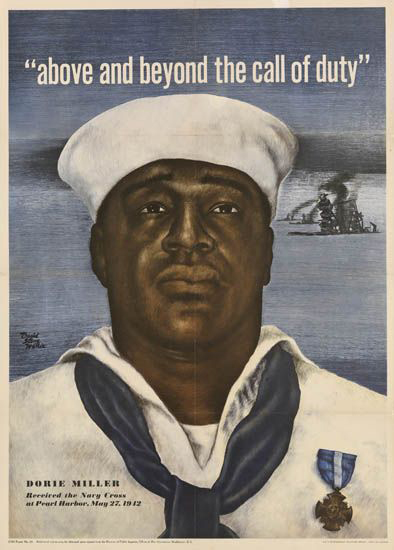
Recruitment poster of the U.S. Navy from 1943 with the portrait of Miller on it. Source: U.S. National Archives
USS Liscome Bay
In December 1942 and January 1943, Miller toured the United States and gave several speeches, including in his hometown of Waco. He was even featured on a recruiting poster. Miller was eventually transferred to the USS Liscome Bay in May 1943 and a promotion to third class cook followed. This ship took part in the Battle of the Makin Islands in the Pacific. On November 24, 1943, Liscome Bay was hit by the Japanese submarine I-175 with a torpedo, which detonated the bomb bay. 646 men on board went down with the ship. 272 were saved. Doris Miller was not among the rescued men.
Today, Doris "Dorie" Miller is viewed by many African Americans as a role model. In addition, various schools were named after him and plays of his actions were made for the radio. In the United States Navy there was a frigate bearing his name, the USS Miller (FF-1091). He was even portrayed in movies, such as "Tora! Tora! Tora!" (1970) and "Pearl Harbor" (2001). In 2010 his image appeared on a postage stamp.
Notes
- USS West Virginia's Action Report, 11 December 1941, Naval History and Heritage Command.
- Cook Third Class Doris Miller's Navy Cross Citation, Naval History and Heritage Command.
Definitielijst
- machine gun
- Machine gun, an automatic heavy quick firearm.
- torpedo
- A weapon of war. A cigar shaped body fitted with explosives and a propulsion and control mechanism. Intended to target after launch a nearby enemy ship and disable it by underwater explosion.
Information
- Article by:
- Samuel de Korte
- Translated by:
- Sanjay Bhoep
- Published on:
- 19-01-2025
- Feedback?
- Send it!
